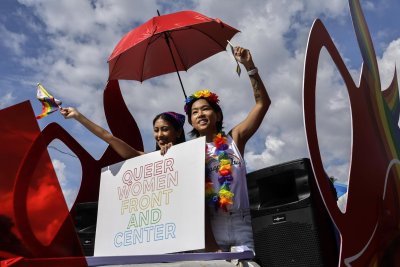Philippine Supreme Court rules same-sex partners can co-own property

Parade participants ride on a float during the LoveLaban Pride March in Quezon City, Metro Manila, Philippines, on June 28, 2025. Manila’s Supreme Court on Tuesday ruled that same-sex partners can co-own property. File Photo by Rolex Dela Pena/EPA
Feb. 10 (UPI) — Same-sex partners can legally co-own property in the Philippines, the nation’s Supreme Court announced Tuesday, a landmark decision for LGBTQ rights in the overwhelmingly Christian nation.
The ruling, which was dated Thursday but released Tuesday, states for the first time that same-sex partners can jointly own property under Article 148 of the Family Code, the country’s primary law governing marriage, family and property relations.
“Our laws should be read from more contemporary lenses. We must bear in mind how the lived realities of many couples in the Philippines are now far from heteronormative standards,” Senior Associate Justice Marvic Leonen said in a concurring opinion.
“To be different is not to be abnormal. A same-sex relationship is a normal relationship and therefore should be covered by Article 148 of the Family Code. Otherwise, we render legally invisible some forms of legitimate intimate relationships.”
The ruling comes in litigation over ownership of a Quezon City house once inhabited by same-sex couple Jennifer Josef and Evalyn Ursua.
They purchased the property in 2006, agreeing to register it under Ursua’s name for ease of bank transactions. According to court documents, when they separated, they agreed to sell the house and divide the proceeds equally.
However, Josef filed a complaint for partition of the property and damages after Ursua refused to sell it, recognize Josef as a co-owner or give her half of the property.
Same-sex unions are illegal in the conservative Christian nation where public support of such relations was only about 22%, according to a 2018 survey by the nonprofit social research institute Social Weather Stations.
Shared property is governed under two provisions of the Philippine Family Code: Article 147, which applies to legally married couples; and Article 148, which concerns couples who cannot legally marry, such as so-called adulterous heterosexual relationships, incestuous or otherwise prohibited relationships and bigamous or polygamous marriages.
This effectively left same-sex couples without a clear legal basis to assert shared property claims.
The case made its way to the Supreme Court after a lower court and then an appeals court ruled against Josef.
In its ruling, the Supreme Court reversed the previous orders, citing a 2007 document signed by Ursua that recognized Josef as co-owner of the property into which she paid 50% of the expenses for its acquisition and renovation.
With its ruling, the high court clarified the provisions of the Family Code to state that same-sex couples fall under Article 148 since marriage is only permitted between a man and a woman.
The justices also stated that without a law recognizing same-sex marriage, Congress and local governments must work to address issues affecting the rights of same-sex couples.
“This Court does not have the monopoly to assure the freedom and rights of homosexual couples,” the Second Division of the Supreme Court said.
“With the political, moral and cultural questions that surround the issue concerning the rights of same-sex couples, political departments, especially the Congress, must be involved to quest for solutions, which balance interests while maintaining fealty to fundamental freedoms. The process of legislation exposes the experiences of homosexuals who have been oppressed, ensuring that they are understood by those stand with the majority.”
